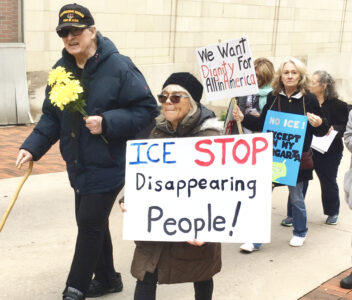Valley mob figure, Orlando Carabbia, dies at 93
STRUTHERS — Orlando Carabbia, 93, who with his brothers at one time controlled illegal gambling in the Mahoning Valley, has died.
He was born April 4, 1927, and died a week ago, April 3, according to information provided by Kirila Funeral Home on its website, which did not provide an obituary.
Visitation is 6 to 8 p.m. Monday, at the funeral home, 258 Poland Ave. The funeral Mass will be 11:30 a.m. Tuesday at Christ Our Savior Parish at St. Nicholas Church, 764 Fifth St.
Orlando Carabbia had been in and out of prison since the 1980s, serving state and federal sentences for gambling, bribery and racketeering. Federal charges against the half-owner of Crown Music and Vending of Struthers alleged he operated the business through a pattern of racketeering that involved illegal poker machines.
A spokeswoman for the Ohio Department of Rehabilitation and Correction on Friday confirmed prison records indicated Carabbia served time for bribery, being admitted June 14, 1991, in a state prison. Further information was not immediately accessible due to the age of the records.
Carabbia’s secret audio recordings resulted in federal charges against late U.S. Rep. James A. Traficant Jr.
Orlando and his brother Charles secretly had recorded discussions that took place with Traficant about bribes they were paying him during his 1980 campaign to become Mahoning County sheriff.
Traficant died in 2014.
During his early days in politics, a young Traficant told Carabbia he had laundered thousands of dollars in mob money through a law firm.
The conversation was contained in recordings made by Charles Carabbia, apparently without Traficant’s knowledge, during a meeting days after Traficant won the Mahoning County sheriff’s race in 1980.
Transcripts of portions of the tapes were included in a U.S. Tax Court decision against Traficant.
The meeting was held among Traficant, and Charles and Orlando Carabbia at the Struthers home of Carabbias’ mother, Rose.
On the tape, Traficant describes how he ”washed” $10,000 in cash through a local law firm to cover money mob figures funneled into his sheriff’s campaign.
The tapes of conversations are outlined in the tax court ruling, which says FBI agents discovered the recordings in April 1981, while they were investigating the disappearance of one of Charlie Carabbia’s hitmen.
During initial questioning by the FBI, Traficant admitted the tapes were authentic and signed a written confession that he had taken money from the Carabbias and other mob figures ”with the understanding that certain illegal activities would be allowed to take place in Mahoning County after my election as Sheriffe (sic), I would not interfere with those activities.”
He later rejected the federal government’s offer to cooperate and changed his story, claiming he had taken the money only because he was attempting to infiltrate the mob as part of his new job as sheriff.
Federal agents used the tapes to charge Traficant with corruption. Traficant successfully defended himself against the charges during a 1983 trial. He was elected to the U.S. Congress a year later.
Traficant later was charged again and that time convicted on 10 charges of racketeering, bribery and filing false tax returns. Traficant served seven years in prison and was released in 2009.
He died on his Poland-area farm in 2014.
The Carabbia tapes provided links from Traficant to the Carabbias, known as the head of the Cleveland mob faction, and other reputed mobsters including James ”Brier Hill Jimmy” Prato, head of the Pittsburgh mob faction, and Prato’s successor, Joseph ”Little Joey” Naples.
About a month after the taped meeting, in November 1980, Charlie Carabbia disappeared. He never has been found.
A tax court ruling says Charlie Carabbia taped the Traficant meeting because the mobsters were concerned with the new sheriff’s loyalty to their crime family based in Cleveland — especially in light of the fact Traficant also had taken about $60,000 from the competing Pittsburgh faction.

